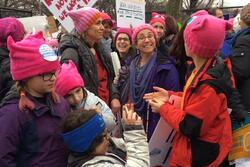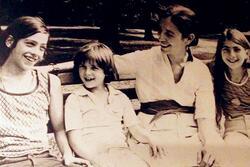Your Jewish Feminist Protest Toolkit
There’s no shortage of outrage these days. With the Trump administration's near constant release of hot air and backwards policies, channeling that righteous anger is easier than ever. Each weekend, in nearly every major city in the country, you can find a protest, march, or rally to attend. And it’s no surprise that at many of these protests, contingents of Jews and Jewish communities can be found praying with their feet.
We Jewish women are no strangers to protest or dissent, from Lilith refusing to submit to Adam and walking out of Eden, to Clara Lemlich leading labor strikes in the early 1900s, to RBG’s scathing Supreme Court dissents. We’re loud. We’re opinionated. And we mobilize.
Did you forget sunscreen at your last rally? Failed to create a quippy poster that captured your rage when you marched for gun rights? If you find yourself anxious to make change but unsure about what to bring, we've got you covered:
A well-thought-out sign and a healthy dose of tikkun olam. If you’re thinking biblical, try Talmud Yevamot 87b, ‘Silence is akin to consent,’ or the classic, “Tzedek, tzedek tirdof – Justice, justice you shall pursue!” Deuteronomy 16:20. There are also some great quotes from rabbis, such as Rabbi A.Y. Kook’s: "I don't speak because I have the power to speak; I speak because I don't have the power to remain silent" and Hillel’s “If I am not for me, who is for me; and if I am (only) for myself, what am I. And if not now, when?”
But my personal favorites are quotes from our foremothers, like Battlin’ Bella Abzug, “A woman's place is in the house - the House of Representatives,” Gloria Steinem, “A feminist is anyone who recognizes the equality and full humanity of women and men," or Alicia Garza, “I am not ready to give up this country without a fight.”
A good pair of shoes and kavanah. Just like you need solid shoes to support your body while you march, the right intentions, or kavanah, supports your emotional connection to social change. Your intentions matter. Attending a march or protest should come from a place of deeply caring about change. Go beyond armchair activism or hashtag slacktivism. March with intention and with reason. Remember the Religious Action Center’s mantra, "Do Justice, Love Mercy, March Proudly.”
Sunscreen and tzedek. I would bring more than you think you need, of both. Even in chilly winter, when it’s not so hot out, UV rays can cause serious skin damage. And even in chilly winter, the flames of social justice can warm you right up.
Olam chesed and a phone charger. Building the world with lovingkindness is a way to recharge ourselves and sustain our work. Loving kindness keeps the burnout, apathy, and overstimulation at bay. Plugging into olam chesed is how we move forward, it’s what gives us purpose and direction.
A handful of mitzvot and a good camera. Document the moment to reflect on it later. Use what you’ve learned to propel yourself forward, just like we use mitzvot. We are obligated to complete 100 a day. They include: To give charity according to one's means (Deut. 15:11), to love the stranger (Deut. 10:19), and not to wrong the stranger in speech (Ex. 22:20).
And lastly, bring your minyan of the grassroots. Just as we cannot pray alone, social justice cannot be achieved alone. We are called to relieve a neighbor of her burden and help to unload her beast (Ex. 23:5). To assist in replacing the load upon a neighbor's beast (Deut. 22:4).
Sustainable protest doesn’t have to be at odds with our Jewish values or even practicality. We can make praying with our feet worthwhile by blending the best of both worlds. Our foremothers, the matriarchs of some of the most important movements in history, found ways to lean into the tension between the practical and the ideal. And we can use our spirituality to heal from, and even prevent, activist burnout. March forth with kedusha, march with holiness.







